Consistency is vital for antibiotic-free poultry production
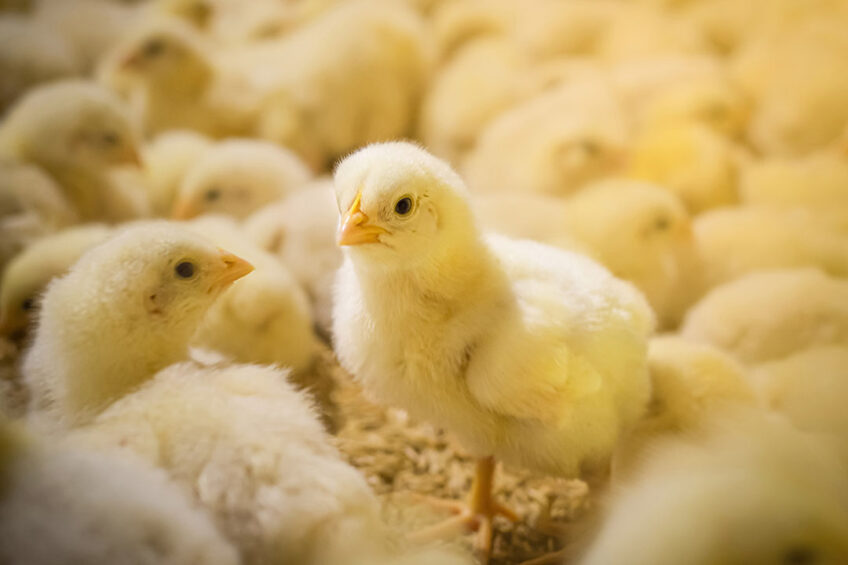
A focus within the poultry and feed industries is to remove or reduce reliance on antibiotics. Feed additives could be an alternative to antibiotics, but the main challenge is they need to perform consistently under commercial conditions. A probiotic that has a consistent action and can enhance animal resilience is an excellent alternative and can ensure the sustainability of poultry production.
The reduction and elimination of antibiotics has been surveyed* as being the greatest challenge to feeding programmes by the poultry industry. This year, 24% of the respondents have reported that their operations are antibiotic free (ABF), that is 3% more than the previous year. A further 25% stated that 50% of their poultry production was ABF.
However, new EU regulations on veterinary medicines and medicated feeds will come into force at the end of January 2022. One of the main objectives of this legislation is to: “strengthen the EU’s actions to fight antimicrobial resistance through specific measures, thus ensuring a prudent and responsible use of antimicrobials in animals, including reserving certain antimicrobials for the treatment of infections in people.” This aim, along with consumer pressure, means that ABF production is expected to continue to grow. Around 60% of broiler production in the USA is ABF. This practice is also growing in Latin America and Asia, particularly in those countries that export to the EU and China.
Challenges
The industry faces 2 significant poultry health challenges because of antibiotic reduction/elimination: necrotic enteritis and coccidiosis. Alternative feed additives that promote beneficial microbiome and support the immune function and gut barrier have a role to play in such challenges. Improved gut health and animal resilience will also help poultry deal with these challenges.
A well-developed gut and optimal microbiome help support poultry performance and enable birds to deal with challenges better – in turn reducing the need for antibiotics. Gut health is important for both the immune function and nutrient absorption, both of which have a positive impact on the health and growth of poultry. The use of probiotics has grown as ABF production has increased, along with a greater understanding of the importance of a healthy gut microbiome.
Dependable product
The main concern when replacing antibiotics is inconsistent results from feed additive alternatives. The survey respondents utilised and/or combined probiotics (64%), with organics acids (61%), enzymes (57%) and phytogenics (51%). They reported that probiotics showed a good level of efficacy (72% in 2020), as did organic acids (69% in 2020). In 2021, 59% of the interviewed people were planning to increase their use of probiotics; however, not all probiotics are the same.
Alterion is a complete probiotic solution for poultry, specifically designed to deliver a consistent performance. Developed by Adisseo, an expert in animal nutrition, in collaboration with Novozymes, the world leader in biological solutions, the product is the result of a stringent selection process: over 900 AAFCO-listed bacterial strains were screened, before testing their activities in vitro and in vivo.
Consistency throughout
In spore form, Bacilli are naturally protected from pressure, acidity and temperature. The most stable strain – Bacillus subtilis DSM 29784 – was chosen to provide superior safety, stability, effectiveness and functioning. This naturally occurring bacterial strain is harmless for animals and humans and does not contain antibiotic resistance genes, which is vital for the safety of the product and to preserve the health and welfare of animals.
Thanks to an innovative formulation, probiotic spores are ‘glued’ onto calcium carbonate particles. This advanced process ensures a low level of dust, low segregation of the spores and no demixing of the product in feeds or premixes, even after storage.
Resilience
Tests were also carried out to select the strain with the most efficient germination characteristics. Bacillus subtilis DSM 29784’s unique stability and timely germination ensure consistent activity in the intestine, where it produces metabolites and acts at 3 levels:
- on the microbiota – creating a beneficial balance in the microbial populations and functions
- on the intestinal wall – improving the gut barrier function, the size of the villi and the absorption of nutrients
- on the immune system – controlling the inflammatory response
Reliable results
Although it is important to test additives at research institutes, it is also essential, for poultry producers, that products perform consistently under commercial conditions. Bacillus subtilis DSM 29784 was fed to broilers on 3 farms that belong to a French poultry production organisation, over 4 consecutive cycles. These 3 farms were selected from among the top 30% of performing farms. The bacterial enteritis and coccidiosis scoring performed on these farms confirmed that all the flocks had a good health status. When performance was already excellent, the data showed that FCR (standardised to 1.85 kg of the body weight) was on average improved by 3 points and liveweight by 6.5 grams when the birds were fed Alterion (Table 1). Such improvements in performance led to a 2% better European Broiler Index (EBI) and a 0.54 € /m² gross margin. A foot pad dermatitis (FPD) scoring system is used by slaughterhouses, along with other carcass quality measures, to evaluate the welfare of broiler flocks. The addition of Bacillus subtilis DSM 29784 reduced the level of severe FPD scores by over 10%, which resulted in a higher carcass value for the producers (Figure 1).
Figure 1 – Alterion reduced severe foot pad dermatitis scores in broilers under commercial conditions.
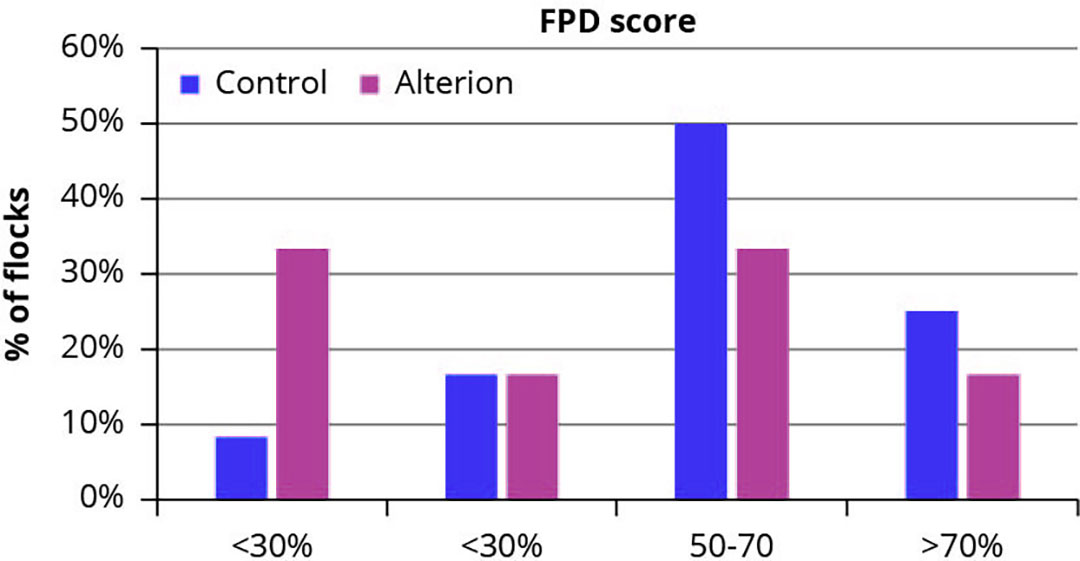
Pododermatitis lesions were evaluated at a slaughter level as the % of the birds of the flock that showed severe FPD lesions. The obtained % is the proportion of birds from the flock that showed less than 30%, 30 to 50%,50 to 70% and over 70% severe FPD lesions.
There was a significant reduction in the cloacal presence of Enterococcus cecorum and a tendency toward a reduced Proteobacteria-to-Firmicutes ratio, thus indicating a more balanced microbiota, with a greater proportion of butyrate producing bacteria. The consistency of these positive results has been backed up by studies on commercial farms in Hungary, Russia and Poland. In all 3 trials, broilers fed Alterion showed a better FCR and overall performance (Figure 2). EBI standardises and compares technical results: feed conversion, mortality, and daily gain. The evaluation incorporated data from over 1,200,000 birds and showed a consistent improvement in performance under a variety of field conditions.
Consistent solution
Bacillus subtilis DSM 29784 helps animals face external challenges, maintains physiological homeostasis, and helps to ensure their resilience. By reducing the impacts of stress on an animal, the energy from the feed is used more for growth, instead of being diverted to the immune system. This means better growth rates and better feed utilisation, but also a saving of resources. The product meets the challenge of consistency in the performance of alternative feed additives, which is required because of the rise in ABF poultry production.
The results of the field trials support Alterion’s consistency to a great extent. The product also leads to a reduction in foot pad dermatitis, a welfare issue that is linked to a better control of gut health parameters. This probiotic solution enhances animal resilience by acting on 3 lines of defence (microbiota, gut barrier and immunity), thus ensuring a consistently improved performance. Trying to keep poultry as healthy as possible reduces the need for antibiotics and improves their welfare. The consistent mix and consistent action of the product makes it a reliable alternative for the responsible use of ATB, and for a wider sustainability of poultry production.
*External survey, reference available upon request
 Beheer
Beheer

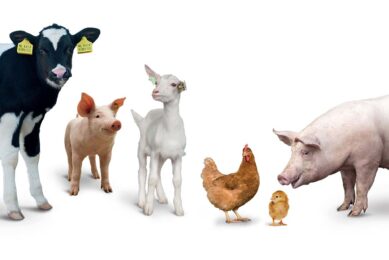
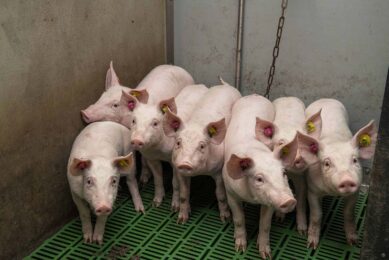
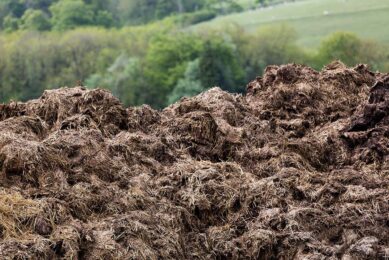
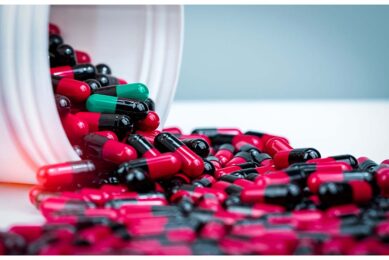
 WP Admin
WP Admin  Bewerk bericht
Bewerk bericht